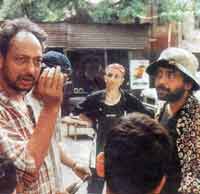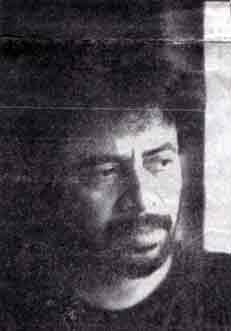|

 Friday
October 22, 1999
Friday
October 22, 1999
The Times of India
Folk
hits from Swapan
Swapan
Basu, the modern-folk icon, has recorded yet another
collection of his 16 super-hit tracks. Among the numbers
"Thakila Dobakhana" and "Bilaire"
are set to new rhythm in tune with the changing taste
in music. Swapan has recently completed his tour of
the US and Canada, performing at more than a dozen
shows, where he introduced his new style of fusion
folk music. His next album, he says will consist of
traditional and contemporary folk numbers Good Luck,
Swapan.
|
|
ooooooooooooooooooooooooooooooooooooooooooooooooooooooooooooo
|
| |
Tuesday
30 July 2002 The Times of India

Swapan
Basu hums Philosophical tunes for his Puja album
So
you thought children were only interested in rhythmic
songs, isn't it? But wait. If you were to listen to
"SWAPAN BASU" experiences, you might want
to change your views. "At the recently held Banga
Sanskriti Sammelan, I was surprised to find chileren
requestion me to sing serious songs - not the usual,
funky numbers that we feel they'll enjoy," the
singer recalled. Thus, when he decided to record a Puja
album, Basu made sure that all the eight songs of his
album were deeply philosophical. The recording for this
album titled Matir Bichana is over. "The stoical
numbers by Lalan Phakir are really ttouching,"
he said. The photopraph shows Basu recording Matir Bichana
at a studio at Jessore Road.

|
|
ooooooooooooooooooooooooooooooooooooooooooooooooooooooooooooo
|
| |
| The
Times of India Wednesday 10 April 2002
City
singers in tele-opera
Back
in 1994, Chhanda Dutt, a teacher of St. Augustine's
School, staged a musical based on Charles Dickens' Oliver
Twist. And that was the starting point of Anjan Dutt's
latest venture - Raja Opera,  a
48 episode serial to be aired in ETv from May 15,9:30
pm onwards. This is supposed to be a weekly serial,
The work for this production started around six to seven
months back when Dutt started conducting workshops a
various schools to find the child actors. Finally Abhryjit
Sen, a student of St. Augustine's School was chosen
to play the role of Raja, the central character of the
story. a
48 episode serial to be aired in ETv from May 15,9:30
pm onwards. This is supposed to be a weekly serial,
The work for this production started around six to seven
months back when Dutt started conducting workshops a
various schools to find the child actors. Finally Abhryjit
Sen, a student of St. Augustine's School was chosen
to play the role of Raja, the central character of the
story.
Though
the serial explores the shabby by-lanes of antisocials
and slum dwellers, it is framed in the Pratik Chowdhury,
Shilajit, Swapan Basu, Indranil Sen, Usha Uthup, Anindya
Bose (vocalist of the band Shahar), with the director
himself chipping in as a naraator...
...how
are his fellow musician's reaction to the serial? Pratik
Chowdhury, who plays the role of a corrupted landlord
who wants to sell the slum for a highrise, said, "
I haven't shot till date, but I'm extremely excited
about the project, since I'll be working with my colleagues
of the musical circuit."
Swapan Basu, who is a present shooting for the serial
and is acting in the character of Baba said, "This
is a serial that explores the crisis of survival - a
factor that brings to and financial boundaries."
|
|
|
|
ooooooooooooooooooooooooooooooooooooooooooooooooooooooooooooo
|
| |
| Hit
city Monday 16 September 2002
Two
Decades of Research Make Special Album
Over
the years, Swapan Basu has earned fame as a folk singer.
Of the albums to his credit, many still sell regularly.
Yet, his latest album Matir Bichhana is closest to the
singer's heart. Five of the eight songs in the album
are special because it has taken Basu 20 years to gather
them. "The songs have been collected through extensive
research over two decades," he says.
The
singer, who has won at least three scholarships from
the government of India to research folk music, spent
days visiting villages in Bengal and the Northeast to
collect the songs, which include Haoar gari, Jokhon
phool koli chhilo, Khat palanke shuiya re mon, Manush
nai re eshe and O mor bharer deora, which have never
been released before.
Says Basu, "I moved from village to village collecting
the songs. It wasn't easy as most of them originate
deep in the interiors of India."
Haoar
Gari has its roots in the Alkap folk drama of Murshidabad,
while Jokhon phool koli chhilo comes from the tea gardens
of North Bengal and o mor bhrer deora is a bhawaiya
from North Bengal.
Khaat
palonke is a folk number from Bangladesh. Manush nai
re deshe is a song by Mukunda Das. "These songs
stan apart both in terms of tune and lyrics," says
Basu. The album also includes two Lalon Fakir songs
- Aami ekdino na dekhilam and Chirodin kaancha and Majoj
Thakur's Parankale jodi."
Basu
will make a video of Jokhon phool koli chhilo soon.
A singer who has given us memorable albums like Amar
Kalopakhi, Thakile Dobakhana, etc. Basu is confident
bout song lovers will think of it as a collector's item,"
he says.

|
| ooooooooooooooooooooooooooooooooooooooooooooooooooooooooooooo |
| |
 The
statesman Friday 31 March 2000 The
statesman Friday 31 March 2000
A
feel for folk
Swapan
Basu scored again with his selection of heart-warning
folk songs complete with janjo accompaniment and introductions
in an evening of songs and poems at Kala Mandir presented
by the CESE Cultural Association. His first presentation,
"Ami marame mori" and the following one "Agey
ke sundor din kataitaam" touched the hearts of
listeners. They were followed by his latest "Jhin
jhin hjan hjan", a foot tapping number.
The
Tagore song, "Praner manush achhey praney"
was a rare treat for his fans, as was the Jhumur song
"Kunje asiben hari", a Radha-Krishna number
from Orissa's "Mayurbhanj". It established
Swapan Basu as a linguist and musician who can make
his jabjo "talk".
The
following presentation "Ami takdum takdum jabbai',
a folk song with Bangla dhol as its main accompaniment
(played beautifully by Debashish) brought the flavour
of folk-rap, interspersed with amusing lyrics delivered
as dialogues in aperfect tempo. Swapan Bose's musicians
proved again that "teamwork" goes a long way
in achieving perfection.
The
concluding part of his programme consisted of his more
popular songs like "Bilai-re", "Nandalal
Debdulal" (the best presentation which brought
the house down), "Manasuachharia" - a song
set in Raga Shivaranjani, "Thakliey doba khana"
and the song of Bihu.

|
|
|
|
|
|








